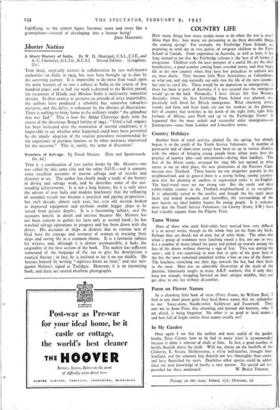Shorter Notices A Short History of India. By W. H.
Moreland, C.S.I., C.I.E., and A. C. Chatteriee, G.C.I.E., K.C.S.I. Second Edition. (Longmans. 2Is.)
THIS book, origizially written in collaboration by two well-known authorities on India in 1924, has now been brought up to date by the surviving partner. It is impossible to do more than touch upon the main features of so Vast a subject as India in the course of five hundred pages, and as half the work is devoted to the British period, the treatment of Hindu and Moslem India is necessarily somewhat sketchy. In their anxiety to preserve an attitude of strict impartiality, the authors have produced a scholarly but somewhat colourless narrative, and this defect is enhanced by the absence of illustrations. There is nothing to bring home to the ordinary reader " the splendour that was Ind." This is how Sir Abdul Chatterjee deals with the causes of the disastrous Bengal famine of 1943: "Until a full enquiry has been instituted after the restoration of normal conditions, it is impossible to say whether what happened could have been prevented by the timely adoption of the routine procedure recommended by the experience of previous famines or by other measures improvised for the occasion." This is, surely, the acme of discretion!
Wonders of salvage. Py David Masters. (Eyre and Spottiswoode. 10s. .6d.)
THIS is a combination of two earlier books by Mr. Masters—one was called by this same title and the other S.O.S.—and it contains some excellent accounts of marine salvage and of wrecks and disasters at sea. The author has clearly made a study of the history of diving and salvage work, and he describes some of the outstanding achievements. It is not a long history, for it is only since the advent of iron hulls and modern machinery that the refloating of stranded vessels has become a practical and paying proposition ; but each decade, almost each year, has seen old records broken as improved equipment and methods enable bigger snips to be raised from greater depths. It is a fascinating subject, and the accounts benefit in detail and interest because Mr. Masters has not been content to gather his facts only at second hand ; he has watched salvage onerations in progress and has been down with the divers. His accounts of ships in distress due to various acts of God have the courage and resource of seamen in rescuing their ships and saving life as a common theme. It is a favourite subject for writers, and, although it is almost inexhaustible, it lacks the originality of the first section of the book. The author has sufficient command of the language of the sea to give his descriptions a nautical flavour ; in fact, he is inclined to lay it on too thickly. He betrays himself by writing "eighteen knots an hour," and also misquotes Nelson's signal at Trafalgar. However, it is an interesting book, and there are several excellent photographs.






















 Previous page
Previous page